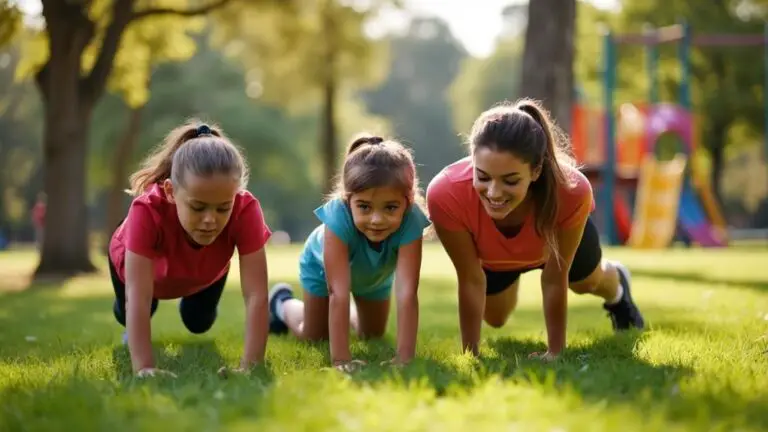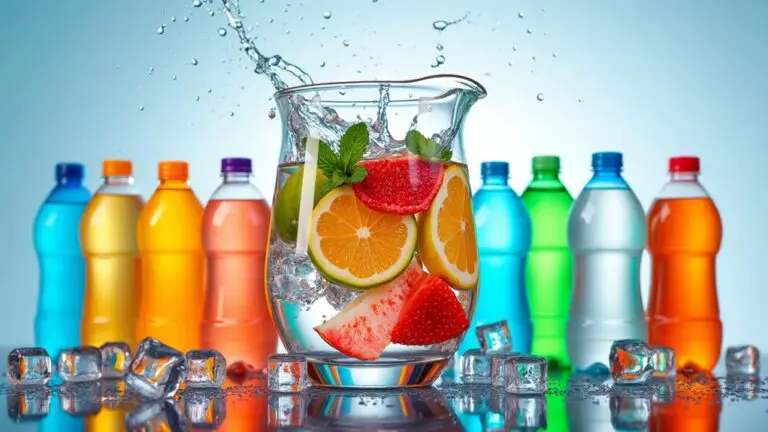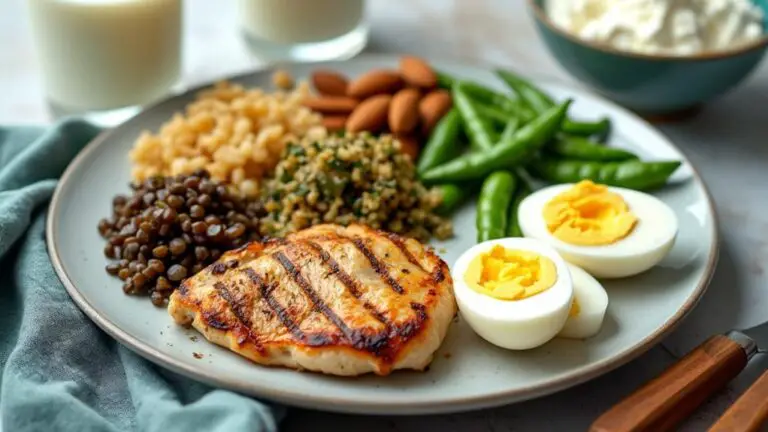Teaching Kids About Staying Hydrated During Sports
Teaching kids about hydration during sports is essential for their performance and safety. You should emphasize the importance of drinking water regularly, both during and outside of activities. Encourage the use of fun water bottles and hydrating snacks to make it enjoyable. Help children recognize signs of dehydration, like excessive thirst or tiredness. Prioritize water over sports drinks for most activities, reserving the latter for intense, prolonged exercise. Create a hydration-friendly environment by providing easy access to water and implementing regular water breaks. By making hydration a habit, you'll help young athletes stay healthy and perform their best. Discover more strategies to keep kids properly hydrated during sports.
Key Takeaways
- Explain the importance of hydration and its impact on athletic performance.
- Teach kids to recognize dehydration symptoms and report them immediately.
- Encourage regular water consumption throughout the day, not just during sports.
- Implement mandatory water breaks every 15-20 minutes during sports activities.
- Use fun, appealing water bottles and hydration challenges to motivate kids.
Importance of Hydration in Sports
When it comes to sports, staying hydrated is absolutely essential for young athletes. Proper hydration can make or break their performance, as even a small decrease in body fluids can impair strength, speed, and endurance.
Young athletes are especially vulnerable to dehydration due to their lower sweating capacity and higher heat generation during activity.
To stay properly hydrated, athletes should drink water before, during, and after sports. A good rule of thumb is to consume 9 ounces of water every 20 minutes during physical activity. This helps maintain energy levels, enhances performance, and aids in recovery.
Parents and coaches should be aware of the signs of dehydration and heat exhaustion, encouraging regular fluid intake to prevent these issues.
Daily Hydration Strategies
Consistency is key when it comes to daily hydration strategies for kids. Encourage them to drink plenty of water throughout the day, especially before sports activities.
Promote fluid intake during school hours and provide hydrating snacks like watermelon and strawberries to supplement their water consumption. To help keep kids motivated, use fun and appealing water bottles that make staying hydrated an enjoyable part of their routine.
Remind children that water is the best choice to stay hydrated by drinking, as it doesn't contain caffeine or added sugars like energy drinks and sodas.
By maintaining proper hydration, kids can avoid signs of heat-related illnesses during sports. Remember, being well-hydrated helps improve performance and keeps kids safe.
Establish a habit of drinking plenty of fluids regularly, ensuring they're prepared for any physical activity.
Recognizing Dehydration Symptoms

A watchful eye can save a young athlete from the dangers of dehydration. You'll want to teach kids about recognizing symptoms of heat-related illnesses to prevent serious health issues. Common signs include dry mouth, fatigue, headaches, and dizziness. Muscle cramps may also indicate that a young athlete isn't drinking enough water.
| Mild Symptoms | Severe Symptoms |
|---|---|
| Excessive thirst | Nausea |
| Tiredness | Light-headedness |
| Dry mouth | Confusion |
| Headache | Rapid heartbeat |
Educate young athletes to report these symptoms immediately. By staying vigilant, you can guarantee kids are staying hydrated during physical activity. Regularly remind them about the importance of fluids and teach them to recognize their body's signals. This proactive approach will help prevent dehydration and keep young athletes safe and performing at their best.
Water Vs. Sports Drinks
Understanding the difference between water and sports drinks is key for young athletes' hydration. Water remains the best choice for most activities, effectively replenishing fluids without added sugars or calories.
It's essential to teach kids that water should be their primary source of hydration during sports.
Sports drinks, while high in electrolytes, are only necessary for intense activities lasting over an hour. Their high sugar content can lead to weight gain and dental issues if consumed too frequently.
The American Academy of Pediatrics stresses that children should prioritize water to maintain proper hydration and energy levels.
Creating Hydration-Friendly Environments

Creating a hydration-friendly environment is essential for encouraging kids to stay properly hydrated during sports and physical activities. You can help by ensuring plenty of water is accessible, providing personal water bottles, and setting up hydration stations throughout the facility.
It's especially important to implement mandatory water breaks every 15-20 minutes to keep kids drinking and prevent heat illness. Make hydration fun by incorporating games or challenges that promote water intake.
Educate coaches and parents on the signs and symptoms of dehydration, fostering a culture of awareness. Include hydration education in pre-season meetings and regular training sessions to establish good habits.
Conclusion
Picture your child as a vibrant flower, needing water to thrive on the sports field. You're the gardener, nurturing their growth with every sip. By instilling smart hydration habits, you're planting seeds of health that'll bloom for years. Remember, it's not just about quenching thirst—it's about fueling their passion and performance. So, keep those water bottles filled and spirits high. Together, you'll cultivate a lifetime of healthy, active adventures.







